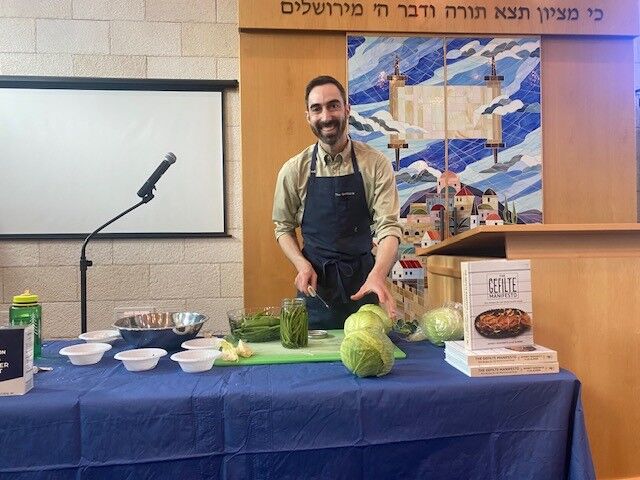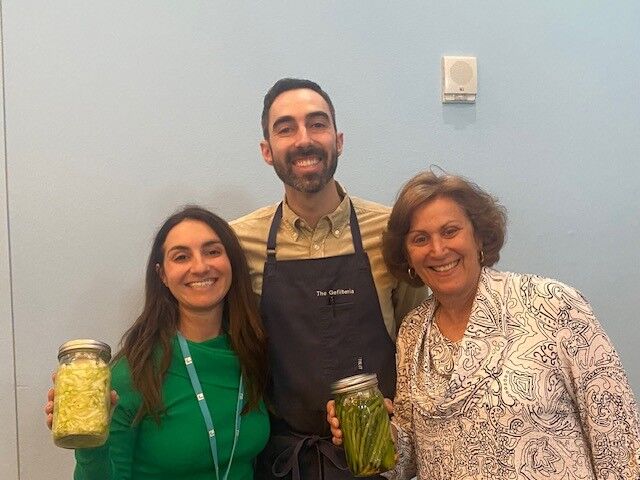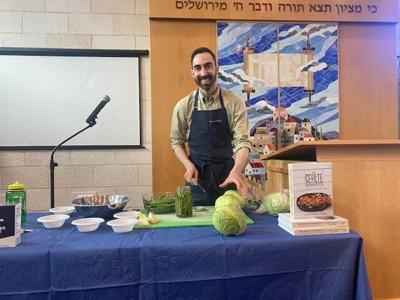As people sorted themselves into groups of five or six at Pardes Jewish Day School on Sunday, March 17, they came to tables set with brand-new mason jars, cucumbers, green beans, kosher salt, peppercorns, mustard seeds and more. However, vinegar was noticeably absent.
“How many of you are surprised that there’s no vinegar?” asked Jeffrey Yoskowitz, self-described “guide for your pickling journey” and the final speaker for the Bureau of Jewish Education of Greater Phoenix’s Passages series. Most people nodded or raised a hand in an affirmative gesture.
Yoskowitz knew most people thought of vinegar as an indispensable pickling ingredient and he was eager to set them straight. (He did the same for pickling spice: “a scam!”)
There are two camps in the pickling world, according to Yoskowitz. On the one hand, there are the mainstream bread and butter pickles that one finds in the middle aisles of the grocery stores floating in their “neon yellow” jars. Some refer to these as “goyishe pickles,” he said, though he calls them “bomb shelter pickles,” a product with no nutritional value but one that will last forever.
In the other camp are “old-fashioned shtetl pickles.” Water, kosher salt, garlic and a few other spices are all it takes to make a delicious and traditional pickle. At least, that's Yoskowitz’s thesis and to prove it, he invited everyone who came to “The Jewish History of Pickling: Make Your Own Pickle” to try his recipe and decide for themselves.
Yoskowitz charmed the crowd from the moment he took the stage and let everyone know there was no reason to be anxious about pickling. “I know it’s a Jewish crowd, so there’s gotta be some anxiety,” he said. After that first crowd-pleasing joke, he had people wrapped around his finger.
“The pickler was very knowledgeable, providing an interesting history and funny stories, and he brought out a lot of laughter,” said Myra Shindler, BJE’s executive director.

From left are Marina Awerbuch, Jeffrey Yoskowitz and Myra Shindler. Awerbuch and Shindler are with the Bureau of Jewish Education of Greater Phoenix.
Yoskowitz studied history at Brown University with the intention of becoming a historian, but after graduation he wanted to “kill a few months” and went to Adamah Farm, a Jewish organic farm in Northwest Connecticut. It turned out to be his “pickle origin story,” he said.
Growing up in New Jersey, he had never given pickles too much thought, except when he picked them up at the deli for his dad or ate them at Passover.
Then he heard Adamah’s pickling legend. Apparently, one summer there was a bumper crop of cucumbers, so big people described it as “drowning in cucumbers.” They couldn’t use them up fast enough.
Finally, someone said, “I have my grandmother’s pickle recipe from Poland. Let’s make ‘em,” They took water, kosher salt, garlic, mustard seeds and peppercorns and made pickles so good they changed the farm’s slogan to “young Jewish farmers changing the world, one pickle at a time.”
Before that, Yoskowitz had imagined Poland as a cold terrain, always in winter, but the farm was a good reality check that just as in Connecticut, garlic and cucumbers in Poland come out of the ground together in July, making the combination of flavors a no-brainer.
“I never thought about seasons or why the flavors go together. It was a bit of wisdom that was pretty special,” he said.
Yoskowitz and his fellow picklers put salt, water and cucumbers in a barrel and waited a week. “We opened it and it was bubbling like seltzer — another Jewish food! I felt transported to Warsaw, standing in my grandfather’s shoes. These weren’t deli pickles; they were alive and the best pickles I’ve ever eaten,” he said.
He went back the next year as an apprentice because he was eager to find out what else he didn’t understand about his heritage. He wondered, “What else was lost to the old country? What other relics of Ashkenazi culture morphed, evolved, Americanized and changed? Pickles were my gateway to finding out.”

People start making pickles at Pardes Jewish Day School on Sunday, March 17.
In the course of becoming a pickler he learned that these so-called shtetl pickles are lacto-fermented and create helpful bacteria and thus good for digestion. Suddenly, eating pickles with a pastrami sandwich took on a new motive. It’s not just about taste. Fatty pastrami — “and the only kind of pastrami you should eat is fatty” — coats your tongue but the pickle cleanses it.
“To get all the flavor out of the sandwich, you take a bite of pickle after every bite. That’s some of the wisdom of our food tradition,” he said.
Pickling itself is a wise way of protecting vegetables during those cold months when nothing grows. A century ago, Passover preparations started in July with the pickling process.
After a few years in the New York food industry, Yoskowitz started Gefilteria, wrote about pickling and traveled the world to learn more and make pickling presentations. He even brought copies of his book, “The Gefilte Manifesto,” for purchase, and every copy was sold by the event’s end.
He speaks to a variety of audiences, but he likes the back and forth he can have with Jewish audiences because they understand all his references, especially about digestion problems.
Last summer, he and his business partner were part of the Smithsonian’s Folklife Festival, representing Yiddish and Jewish culture. They made pickles and other Jewish foods.
“Most people who came to our events were not Jewish and had never heard the word Ashkenazi. We taught them to make pickles but we also had to give them the context,” he told Jewish News. The Jews he was talking to on Sunday, already had a lot of that context.
Yoskowitz was careful to give all the pickling history and instructions before letting people start because “once you all start touching things you’ll go crazy and it will be pandemonium!”
Once he turned the crowd loose, people grabbed cucumbers and green beans (“a pickled or dilly bean is a good starter pickle, guaranteed to have a good crunch, so it’s a little cheat”), garlic and stuffing them into mason jars as fast as they could, talking over one another and laughing loudly.
“One of the things I loved about the event was how it attracted a multi-generational audience, grandparents with grandchildren, parents and kids, everyone talking and enjoying themselves,” Shindler told Jewish News.

Sheryl Quen, right, pours water into a jar to prepare for pickling and Judy Libow, left, reaches for a clove of garlic.
Jacqueline Roalofs came because her husband “loves pickles and eats all the pickles in the house, so I thought it’s time we start to learn how to pickle ourselves,” she told Jewish News.
Sheryl Quen, who grew up in New York, came because she loves pickles. “We used to always see the pickle man at the flea market with the big barrels. We always had pickles at holidays,” she told Jewish News.
This was her first attempt to make pickles herself and she looks forward to trying the recipe on tomatoes, a pickled food she grew up eating.
Like Quen, Judy Libow remembers walking through the market in New York and eating pickles out of a barrel. “I want to know how to make them for myself,” she told Jewish News.
Dee Bierschenk and her husband, Max, found Yaskowitz’s book at the library months ago. When they learned he’d be in town, they snapped up tickets. Now they feel more than ready to make their own pickles and are excited about next year’s Passages lineup.
Yoskowitz emphasized how the traditional process he used has now become trendy. He reminded people not to throw out the brine once the pickles were done — it would take four or five days at room temperature. The brine left by these pickles is the same stuff that goes for $10 a jar at Whole Foods. Marinate your chicken with it or mix it with salad dressing or in a dirty martini, just don’t toss it.
Most of all, he told people to have fun and not stress over pickles that don’t turn out exactly right. “This is the beginning of your pickling journey and sometimes things don’t turn out the way you’d hoped. Just try again,” he said with a big smile on his face.
People seemed to take his words to heart. As they filed out of the room with their jar of future pickles, they were laughing and chatting about what to pickle next. JN











